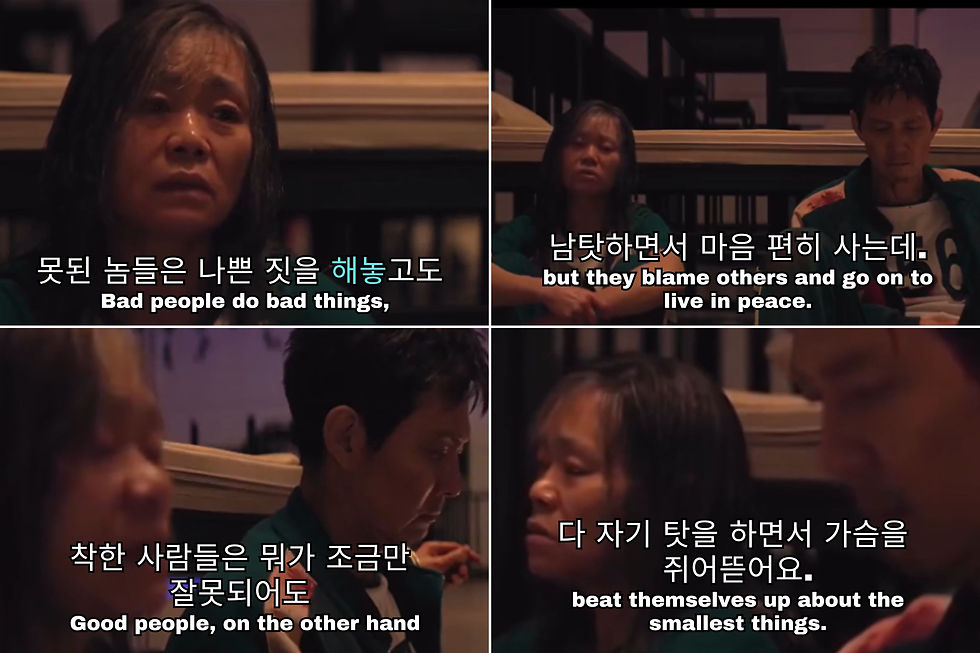Learn Korean Grammar with Squid Game Season 3
- BDB Korean
- Jul 20, 2025
- 3 min read

The long-awaited Squid Game 3 — the final chapter of Netflix’s iconic series—has finally been released! If you’ve been following our blog for a while, you might remember that we featured the first Squid Game in our very first Korean drama post. (Feel free to check it out here if you haven’t!)
In today’s blog, we’re diving into a short but powerful line from a scene between Player 149 (the caring mother) and Player 456 (the main character) in episode 3. No spoilers ahead—just some useful Korean expressions you’ll want to learn!
So grab your notebook and let’s explore 2 Korean grammar from Squid Game 3 together!
Script:
아무리 생각해도 세상이 참 불공평해요.
못된 놈들은 나쁜 짓을 해놓고도 남탓하면서 마음 편히 사는데,
착한 사람들은 뭐가 조금만 잘못되어도 다 자기 탓을 하면서 가슴을 쥐어뜯어요.
No matter how you look at it, life is just unfair.
Bad people do bad things, blame others, and still live in peace,
Good people beat themselves up over the smallest mistakes.
Vocabulary:
세상 - world
불공평 - unfair
못되다 - to be bad / evil
놈 - guy / bastard
나쁜짓 - bad deed
남탓 - blame
마음 - heart / mind / feeling
편히 - comfortably
착하다 - to be kind
잘못되다 - to be wrong
가슴 - chest / heart (emotionally)
쥐어뜯다 - to tear/rip (with hands)
1. 아무리 + Verb / Adjective + 아/어도 (No matter how much you… / Even if you…)

"아무리 생각해도 세상이 참 불공평해요."
"No matter how you look at it, life is just unfair."
Grammar Explanation
This grammar is used to show that no matter how much something is done, the result doesn’t change.
It combines "아무리", which means "no matter how", with "-아/어/해도", which means "even if".
To use, attach -아/어/해도 to the verb or adjective stem after 아무리.
공부하다 → 공부해도: 아무리 공부해도
달리다 + 달리 + 어도 → 달려도: 아무리 달려도
Example Sentences
아무리 먹어도 배고파요. No matter how much I eat, I’m still hungry.
아무리 공부해도 이해가 안 돼요. Even if I study a lot, I still don’t understand.
아무리 달려도 늦을 것 같아요. No matter how fast I run, I think I’ll be late.
2. Verb + -아/어 놓다 (To do something and leave it that way / To do in advance)

"못된 놈들은 나쁜 짓을 해놓고도 남탓하면서 마음 편히 사는데"
"Bad people do bad things, but they blame others and go on to live in peace"
Grammar Explanation
This grammar is used when you do something and keep it in that condition, or prepare something for later.
It combines "-아/어", which connects the verb stem, and "놓다", which means “to place” or “to leave (as is)”.
To use, -아/어 놓다 to the stem of an action verb.
Use -아/어 놨어요 when talking in past tense.
쓰 + 어 놓다 → 써놓다
열 + 어 놓다 → 열어놓다
만들어 놓다 + -았/어요 → 만들어 놨어요
Example Sentences
김밥을 미리 만들어 놨어요. I made kimbap in advance (and left it ready).
숙제를 다 해 놓았어요. I finished the homework ahead of time.
우산을 문 옆에 놓아 놓았어요. I put the umbrella by the door.
And that’s it!
Even in a short scene, Squid Game 3 gives us powerful lines filled with emotion, eye-opening truths—and Korean grammar points we can learn from!
If you haven’t started watching the new season yet, now’s the perfect time to dive in.
If you enjoyed this blog, drop a comment and let me know which K-drama we should explore next!



Comments